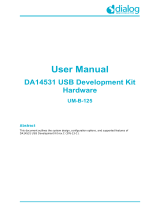WizFi360 Hardware Design Guide 3 / 15
Table of Contents
1. Overview ................................................................................................................................................................... 4
2. Pin Definitions ....................................................................................................................................................... 4
2.1. Initial Value of GPIO Pins ................................................................................................................... 5
3. Circuit ......................................................................................................................................................................... 7
3.1. System.......................................................................................................................................................... 7
3.2. Power ............................................................................................................................................................ 8
3.3. UART ............................................................................................................................................................. 8
3.4. SPI ................................................................................................................................................................... 9
3.5. ETC .................................................................................................................................................................. 9
4. PCB Footprint ..................................................................................................................................................... 12
5. PCB layout ............................................................................................................................................................ 13















